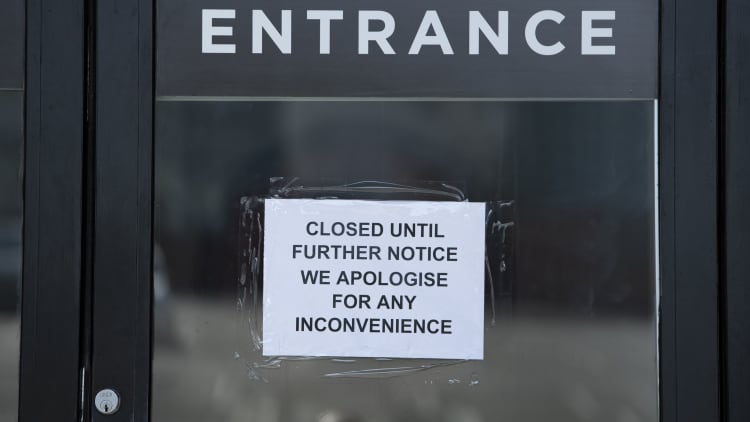America's department store chains have seen their odds of defaulting escalate more than any other consumer-facing companies over the past month, according to a new analysis by S&P Global Market Intelligence.
"Coronavirus-related challenges are mounting for an already struggling group of retailers," the firm said in a note to clients Thursday morning.
S&P Global Market Intelligence's median, one-year probability of default represents the odds that a company will default on its debt within the next year, based on fluctuations in a company's share price and other risk factors. That jumped to higher than 40% for some industries earlier this month. That's compared with being under 10% at the end of February, according to the firm's analysis of publicly traded consumer companies in the U.S.
Department store operators, including Macy's and J.C. Penney, had the highest median, one-year probability of default, 42.1%, as of April 7.
Second to department store chains are hotels, resorts and cruise lines.
Industries with the lowest rate of default include businesses that sell consumer staples and household products, the analysis said.
A separate report by Cowen & Co. late last month said America's department stores can make it as much as eight months with their stores closed before liquidity troubles mount. Many retailers, including Macy's and Kohl's, have been drawing down their credit revolvers to come up with cash.
Nordstrom on Wednesday said its financial situation could become distressed if its stores stay dark for much longer because of COVID-19. The Seattle-based department store chain said the pandemic, so far, has had a "substantial impact" on its business.
Macy's, meantime, was dropped from the S&P 500 earlier this month and replaced by Carrier Global. Macy's market cap has fallen from roughly $6 billion in mid-February to about $2.1 billion today.
The whole department store industry has taken a brutal beating on Wall Street of late.
Macy's shares have fallen more than 64% this year. Penney's stock is down nearly 70%, bringing its market cap to $110.7 million. Nordstrom, with a market cap of about $3.3 billion, has watched its stock tank nearly 50% this year. Kohl's, with a market cap of $3.1 billion, has seen shares fall roughly 62% year to date.
Department stores today are "a bunch of fossils," former Rue21 CEO Bob Fisch told CNBC in an interview. "They belong in the Museum of Natural History."
Even before the coronavirus outbreak, though, the category was struggling to find its footing. This past holiday season, department store sales fell 1.8% from Nov. 1 through Dec. 24, according to Mastercard Spending Pulse.
The number of people looking to department stores as a go-to place to shop has been declining. More and more of the brands found in department stores, such as Nike, Levi Strauss and Kate Spade, have been investing in their own stores and websites to sell more directly to consumers and bypass wholesalers.
With stores temporarily closed because of the coronavirus pandemic, sales declines will worsen in 2020.
And lower sales equate to more trouble for department store chains. Several have been closing stores to cut costs. Neiman Marcus is reportedly stepping up preparations to seek bankruptcy protection. If that occurs, it will not be the first. In 2018, Sears filed for bankruptcy protection, but it is still struggling. Bon-Ton was forced to liquidate that same year.



